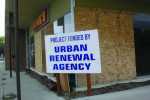Mountain Home to gain national retailer

After nearly 18 months of work marked by setbacks and uncertainty, plans finally took shape late last week to bring a new department store to Mountain Home.
In a message Friday evening, the Houston-based Stage Stores company announced it will open a Bealls store in the former King's building in the city's downtown area.
The agreement will mark a new beginning of sorts for the building, located at the corner of American Legion Boulevard and North 2nd East Street.
"I am just thrilled that this year and a half process has finally become a reality," said Paula Riggs, the city's economic development director. "We had so many ups and downs... with so many roadblocks, so for it to finally come to fruition is so exciting."
Bealls is one of five chain stores owned by Stage Stores, which operates more than 800 stores in 40 states. Currently scheduled to open by early October, the store will feature a line of name-brand merchandise, including men's and women's apparel, shoes, beauty and fragrance products as well as home accessories and gifts.
Company officials expect to sign the formal lease agreement later this week.
Mayor Tom Rist credited the Mountain Home Urban Renewal Committee's "due diligence" over the past 18 months to make this business venture possible here. Without their efforts, "this thing never would've happened," he said.
Bringing the retailer to Mountain Home involved a two-stage process. The first involved purchasing the King's building, which closed its doors 10 years ago shortly after Wal-Mart opened on the city's east side. According to Lisa Anderson, who chairs the urban renewal district board, plans to purchase the building started taking shape shortly after the retailer expressed interest in coming here.
However, subsequent legal complications and roadblocks delayed the building purchase and threatened to derail the entire business deal, according to Anderson.
"Just to acquire the building was a very difficult, lengthy process over long distance (phone calls) between the real estate agent, the bank and the owner of the property," Anderson said. Between those conversations, the urban renewal district team had to arrange time to meet during formal public hearings to approve each step in the process.
Compounding matters further were plans by state legislators to enact tougher laws regarding urban renewal districts, which would make it harder for small communities like Mountain Home to maintain organizations like this, Rist said. Subsequent amendments to the urban renewal district plan here helped alleviate these types of concerns.
"We could've had this done six months ago, but the urban renewal board felt that we needed to do this right," Riggs said regarding the updates to the district's plan.
In October 2011, the urban renewal district signed the paperwork that paved the way to purchase the long-vacant building. In addition to the $235,000 purchase price, district officials expect to spend between $300,000 and $500,000 to remodel the building, which includes removing hazardous asbestos located in the flooring and possibly in the walls.
Since the building was originally built more than a half a century ago, changes in building codes prompted these upgrades to bring it up to current code standards. If everything remains on schedule, the asbestos abatement and subsequent renovation work would take roughly four months to complete, according to Anderson.
"It's going to be a very extensive renovation," she said.
In addition to the interior improvements, the project involves refurbishing the roof and parking lot along with relocating the heating, ventilation and air conditioning system. Meanwhile, a $20,000 grant from Capitol Matrix will lead to additional improvements to the surrounding landscape.
To start, the company expects to hire at least seven full-time employees along with another half dozen part-time or seasonal staff members, according to Riggs. With more than 12,600 square feet of available space on the ground floor, the incoming company doesn't expect to use the existing basement or mezzanine areas since they lack public elevator access.
Looking to the future, the urban renewal committee chairwoman said this refurbished building and new business gives a Mountain Home "a big shot in the economic arm" of this city.
"It's certainly going to serve as an incentive for other businesses to locate in that downtown area, particularly when you have a location that is so visible to the community," the mayor added.
Riggs expects this new store to create a "snowball effect" and prompt other shops, restaurants and stores to move to this part of town.
"That's going to bring people to downtown Mountain Home to shop" and will help fill the empty storefronts in this part of the city, she said.
Anderson expects this will also bring some much-needed economic relief to existing stores in this part of town that have held on during the ongoing economic downturn.
"This is going to be the boost they need," she said.
For shoppers in Mountain Home and surrounding communities, the Bealls store will carry a variety of merchandise that businesses here have never carried, according to Riggs.
"Instead of people having to head to Boise for their kids' athletic shoes, they will now have a place in Mountain Home where they can find those name-brand products," the economic development director said.
The mayor and Riggs emphasized that the efforts of the urban renewal committee -- an all-volunteer organization -- made this business venture a reality. In total, it took this group hundreds of hours to seal the building purchase as well as the subsequent business agreement with the Stage Store company.
"This would not be a reality if we didn't have an urban renewal district," Riggs said. "They are the only incentive that I have as an economic development director to encourage businesses to come here."
"I don't know what other tools a local community has, other than urban renewal districts," Rist added. "Urban renewal is the only way to make things like these happen."
